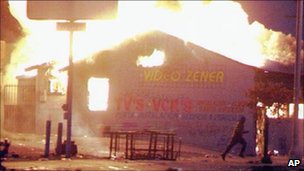BBC News - August 12, 2011
 Widespread violence broke out across Los Angeles in 1992 following the Rodney King trial
Widespread violence broke out across Los Angeles in 1992 following the Rodney King trial
Prime Minister David Cameron is to consult US "supercop" Bill Bratton on how to deal with city rioting. Mr Bratton, the former New York and Los Angeles police chief, is credited with dramatically reducing crime after the 1992 riots in LA.
The burning buildings, looting, and clashes with police in Britain this week have brought back some vivid memories in Los Angeles.
In 1992, riots sparked by a row over racism spread across the city and for six days the fires burned and the violence raged.
Until a week ago they were the defining images of urban rioting etched on the public memory here and around the world.
Now David Cameron is turning to the man who is credited with restoring law and order in the city - former LAPD chief Bill Bratton - dubbed a "US Supercop" by the British newspapers.
Mr Bratton, having earlier served as the head of the NYPD in New York, took over the LAPD a decade after the 1992 riots.
Recent Comments